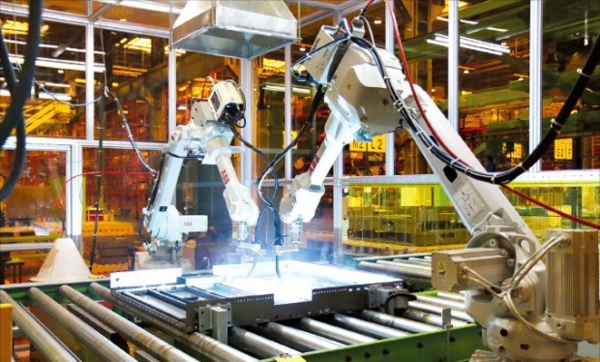Enter 2021.03.11 06:00
It is a product that carries two elevators in one hoistway.
‘Wheeing’.
On the afternoon of the 9th, TK Elevator (formerly ThyssenKrupp Elevator) entered the Cheonan factory in Chungnam, and the roar of robots and automated machines moving thick iron plates from dozens of conveyor belts caught my ear. If you take the down line of the Gyeongbu Expressway and run near the Cheonan Entrance Rest Area, you will see the towering TK Elevator Tower on the left. The Cheonan Smart Factory is located right next to this tower with the size of 5 soccer fields (about 36,000m2).
Elevators make parts at the factory and assemble them at the construction site. A total of four production lines were running in the Cheonan plant: Dohwa, Ceiling, Painting, and Inverter. In the production line where 30 skilled workers were attached to the elevator door three years ago, automatic sheet metal equipment was introduced, and only three engineers who manage the system are employed. When they pressed the control button, it took less than 80 seconds for the flat iron plate to be reborn as an elevator door.
In the line next to the automatic sheet metal facility, two arm-like robotic welders moved rapidly and spattered welding sparks. Manager Ahn said, “Thanks to the welding robot introduced for the first time in the elevator industry, the error rate for each part has been reduced to near zero, and the efficiency has increased.”

Elevator parts are produced by automated equipment, but at the TKE plant, each line manager gathers at a round stand table every morning to have a meeting to share quality checks, purchase, equipment, production, and material management. Ahn said, “We are paying special attention to safety management, such as displaying different colors for each date depending on the safety situation.”
When I moved to the building next to the production line factory, a smart distribution center with a size of 5000 m2 (about 1,500 pyeong) appeared. Elevator parts for construction sites such as’Gajwa-dong OO Apartment’,’Dobong-dong’ and’Gonghyang-dong’ were packed in sets and filled the warehouse. The smart distribution center divides elevator parts required for elevator installation into 22 boxes. Barcodes were recorded on all boxes and scanned when picking up or loading/unloading, so that the site manager could know the information such as the arrival time of the part at the construction site. An average of 50 sets per day are shipped here.

Deuk-Hyun Seo, CEO of TKE Korea, said, “The elevator market continues to grow, but when I belong to a steel industry-oriented company, it was difficult to respond quickly to market changes. After independence, I am working with excitement with full support.”
This year’s goal of TKE is to be the No. 1 market share for new installations. CEO Seo said, “Last year sales increased by 10%, and market share has been increasing.” said. To this end, CEO Seo announced his goal of winning orders for the’twin elevator’ building, which amounts to 300 million to 400 million won per elevator. Twin elevators are a system in which two elevators operate independently in one hoistway, and it is said that only TKE has been commercialized. Last year, TKE delivered 56 twin elevators to Yeouido Park One (333m), the third tallest building in Korea.

Regarding the possibility of IPO in the future, CEO Seo said, “It is starting now, so I think there will be various possibilities.” Because it is not, it will continue to act as a cash cow.”
